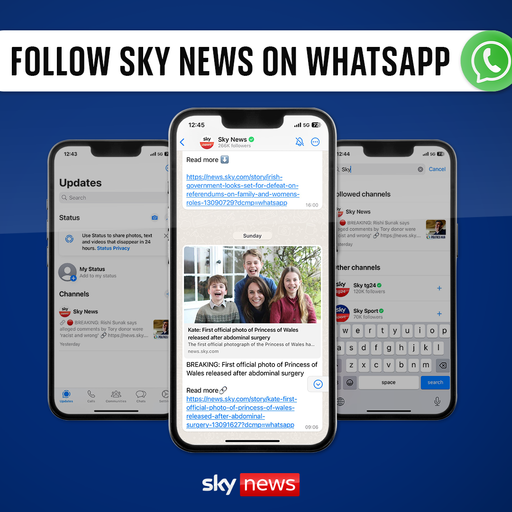Two large funerals for key leaders in Hamas and Hezbollah were held in two capital cities – as Israeli leaders said they were on high alert for retaliatory attacks, symbolising the deepening crisis the region is now mired in.
Tens of thousands of mourners massed in the Iranian capital, Tehran, for the funeral of Ismail Haniyeh, the Hamas leader who the mourners believed was central to lasting ceasefire negotiations in Gaza.
While in the Lebanese capital Beirut, there was lavish pomp and ceremony on show for the funeral of key commander Fuad Shukr, considered a close confidante and the right-hand man of the head of Hezbollah.
Middle East latest – Iran ‘attack order’ puts region on edge
In the midst of this outpouring of grief, the messages coming out of both capitals appeared grim with few expecting anything other than a dramatic and violent response directed against Israel from Iran and Lebanon’s Hezbollah.
The indications are that any response may also include the other partners of the so-called Axis of Resistance, as intimated by Hezbollah leader Hassan Nasrullah.
“The Resistance”, as the partners constantly refer to the alliance, is headed by Iran but includes partners like the powerful Lebanese Hezbollah group, but also militant extremist fighting groups in Iraq, Syria, and Yemen’s Houthis.
More on Hamas
Related Topics:
Image: Ayatollah Ali Khamenei led a prayer over the coffins of Haniyeh and his bodyguard. Pic: AP
Image: Haniyeh’s funeral ceremony took place in Tehran. Pic: AP
All receive support from Iran and are closely linked in ethos and ideology.
In the hours following Israel’s attacks which the nation’s prime minister, Benyamin Netanyahu, described as delivering a “crushing blow to Iran’s proxies”, the partners of the axis issued statements voicing support for any retaliatory action headed by Iran.
Advertisement
Iran Supreme Leader Ayatollah Khameini told his nation he blamed Israel (although Israel has not claimed responsibility) for the strike in Tehran and said the strike on his country’s soil breached its sovereignty and honour.
Image: Hezbollah supporters held up portraits of Shukr. Pic: AP
Image: Hezbollah militants carried the coffin. Pic: AP
American media outlets reported that the explosives that killed the Hamas leader had been smuggled into his heavily guarded Tehran guesthouse nearly two months before.
“An action like this cannot go unanswered,” the Iranian leader said.
There were similar tones from the Hezbollah leader, who warned in his funeral speech that the war had entered a “different phase” and was spreading.
“We are facing a big battle now,” Nasrullah said.
“It’s beyond a support front now (referencing Hezbollah’s attacks against Gaza, which they claim is in support of those under Israeli bombardment there). “There’s a battle in Gaza, one in south Lebanon, an open battle in Yemen and even in Iraq because it’s all happening at the same time.”
Follow Sky News on WhatsApp
Keep up with all the latest news from the UK and around the world by following Sky News
Tap here
The Israeli leader appeared to be swinging emergency plans into action, chairing a meeting of his top emergency response teams and saying: “Israel is at a very high level of readiness for any scenario both defensively and offensively. We will exact a very heavy price for any act of aggression against us from any arena.”
‘We are ready to die’
In the streets of one of Lebanon’s Palestinian refugee camps, we found groups watching the funerals and speeches unfolding as they readied themselves for what they see as inevitable – almost certain war or at least a dramatic escalation of the current status quo.
“We’ve faced death before,” one woman told us. “We are ready to die if necessary to defend ourselves and the country.”
Another told us: “We will accept whatever Nasrullah decides.”
Image: Residents of a Palestinian camp watched Nazrallah’s speech
Image: There was anger among some in the camp
In this part of Beirut anyway, the Hezbollah leader is speaking to a very loyal audience with the walls plastered with pictures of Ismail Haniyeh.
The new British foreign secretary, David Lammy, flew into Beirut from Qatar to, in his words, dial down the atmosphere and urge “calm heads”.
He met the Lebanese foreign minister, the prime minister and the speaker of the parliament.
“My job as foreign secretary at this critical moment is to be speaking to all sides and urging caution and clear heads,” he told us from the UK ambassador’s residence in the capital.
“And to be absolutely clear it’s in no-one interests, no-one’s interest to see a regional war in this part of the world.”
Source : Sky News








